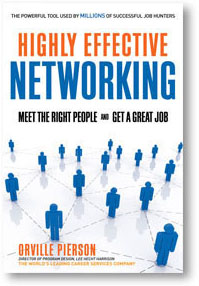 This article was originally published on January 8th, 2010. Even though it’s from a few years back, it’s right on point.
This article was originally published on January 8th, 2010. Even though it’s from a few years back, it’s right on point.
After writing Step by Step Networking I’m always on the lookout for other books on networking. I love finding different tools and philosophies on networking to help refine my approach. Although focused more on job seekers, Orville Pierson’s Highly Effective Networking is a great primer for how to incorporate networking into your professional career. The ideas and approaches that he covers are incredibly useful if you are currently networking to find a job, but they also apply to any networking situation.
Orville and I share a belief in the long-term scope of networking. It’s not just something you do when you need a job or sales prospects, but rather a way of conducting your business life. For Orville, there are 4 main goals that you can achieve through networking (and I couldn’t agree more):
- Get the word out
- Gather information
- Meet insiders at targeted organizations
- Get in touch with decision makers
Big Thought:
Networking is an important and effective part of the job search when you approach it as a process of building relationships with others before they need your services. Then when they have a job opening, you are a natural choice.
Ideas, Implications, and Questions
- A lot of the book is dedicated to demonstrating that everyone already has a powerful network of contacts from their previous professional experiences and their personal life. It shows that you don’t have to attend networking events to start networking; it can be as simple as picking up the phone and reaching out to people you already know.
- If you are not actively using networking as a tool in your career, you should start right now. Orville points out that “Effective job hunters usually meet the Decision Maker before there is a job opening…” (pg 127). My corollary would be that effective networkers meet with the Decision Maker before they need anything. Too often people wait until they have a need before they start networking, and because of the long-term nature of the process, there’s a delay before they see the results. I think you should always be networking, because then you can leverage the relationships much more quickly.
- “It’s not about having a huge network. It’s about using the network you have.” (pg 47). True, true, true. A huge mistake people make is to assume that master networkers need to have huge networks. While having a sizeable network can be helpful, it doesn’t have to be massive. If you build strong relationships with a core of well-placed contacts, that’s a great base. Sometimes I find myself falling into the trap of talking about how big my network is – I’m quick to point out, though, that it’s not necessary to know a lot of people, but rather to know people well.
- The one area that Orville breezes through is on how to leverage the relationships with your network. He does a great job showing where to find possible connections and how to start and build relationships, but there is an underlying assumption that once you have the relationship, people will automatically give you what you want. It’s similar to sales books that only show how to build rapport and show value – in the end you still have to ask for the order. I think Orville passes over it because the “sales” side of networking, the asking for what you want, makes people uncomfortable and he knows that it’s hard to coach for that through a book. For networking to be successful, though, it’s not only about developing your networking, but leveraging it.
- I’m a huge fan of meeting people for a cup of coffee when I’m looking to add them to my professional network. It’s a great opportunity to get to know them. Orville agrees that one on one meetings are a great way to build your network, and he points out that there are three aspects of a great networking meeting (pg 65):
- Authentic conversation
- Common interest
- Information exchange
Should you read this book?
Yes, Highly Effective Networking does a good job of spelling out the basics of using networking as a professional development tool. If you are looking to use networking to build any part of your professional life, and especially if you are looking for a job right now, it’s well worth the read. I think Orville really hits the essence of effective networking when he says: “The one most important thing is to make everyone you talk to comfortable.” (pg 23)
